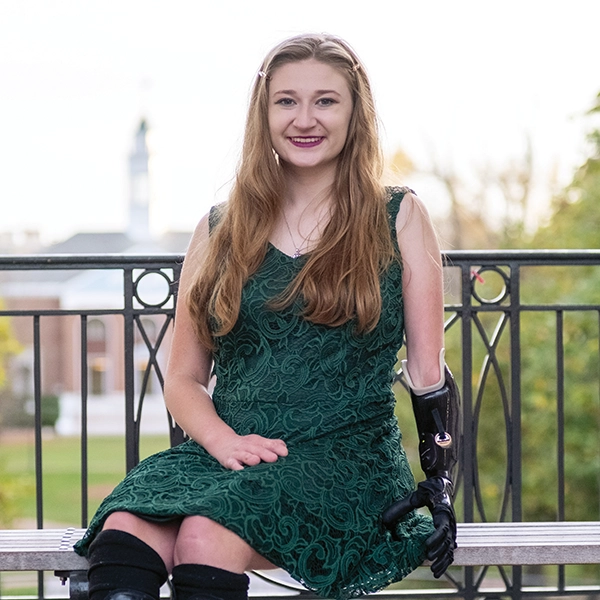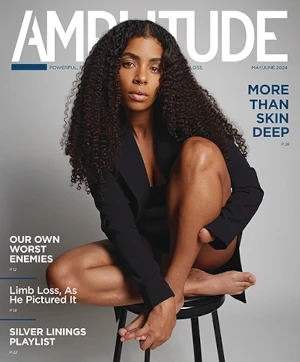by Kate Ketelhohn
[JANUARY 23 UPDATE: Applications are open for the 2024 Breece Fellowship. Get full details at The O&P EDGE.]

I’ve never been very political. So when I first learned about the Breece Fellowship, sponsored annually by the National Association for the Advancement of Orthotics and Prosthetics (NAAOP), I wrote it off as another political experience that wasn’t right for me.
The Breece Fellowship is a paid, ten-week summer internship based in Washington DC. To quote the NAAOP website, “Fellows learn about orthotic and prosthetic (O&P) policy and advocacy at the federal level, [and] how NAAOP and other O&P organizations function on behalf of the O&P community—and in the broader context of rehabilitation and disability policy and advocacy.”
The chance to get paid as an intern sounded pretty good. So did the summer in DC. But as an undergraduate student who’s majoring in biology with the goal of becoming a doctor, I didn’t see how a program focused on O&P policy and advocacy would fit with my academic and professional plans.
My perspective changed when my friend Nikki Grace-Strader told me about her experience as a 2022 Breece Fellow. After hearing what she learned and how she spent her time, I realized the fellowship wouldn’t just make me well versed in law and policy. It would also equip me with some tools to advocate for patients when I become a doctor. And, as an amputee myself, it would help me understand the healthcare policies that affect me directly.
I went through the application process and was thrilled to get selected as the Breece Fellow for 2023. I got my first project on the first day of the program, preparing a report to summarize new Department of Veteran Affairs (VA) directives related to O&P.
While I worked on the report, I attended all kinds of meetings that allowed me to witness important legislative work in action. I learned about the approval process for Centers for Medicare & Medicaid (CMS) coding, I sat in on calls to educate Congressional staffers about NAAOP-supported policies, and I participated in strategy sessions for the So Every Body Can Move campaign.
Meanwhile, my VA research took me deep into the technicalities of how hospitals run, how policies get translated into procedures, and even what devices fall under the definition of prosthetics and orthotics. My research slowly lost the feeling of work and gave way to a feeling of joy. As an amputee who’s spent my whole life interacting with the medical system, I was fascinated to learn why—why our system works the way it does, why government officials support certain policies, and why I sometimes feel there’s a disconnect between providers and patients.
The fellowship included trips to visit VGM & Associates in Iowa and Gainesville Prosthetics in Florida, so I could learn more about the O&P industry from the provider perspective. All the people I met were wonderful, and some of those experiences will stick with me for the rest of my life. One incident made a particularly big impression on me: When I was shadowing at an O&P clinic, I met a girl my age who was receiving her first myoelectric hand. It was one of the first times I’d ever talked to someone so similar to me; I’ll never forget seeing her test the grip patterns.
Another major part of the fellowship was the NAAOP Virtual Fly-In, a day in which NAAOP members have virtual meetings with Capitol Hill staffers all day to educate them about O&P-related concerns and legislation that NAAOP is supporting. The Breece Fellow always plays a major role in scheduling meetings for the Fly-In. In high school, I learned the basics of contacting Congressional representatives, but the fellowship taught me new skills for advocating effectively. The day was a great success, and I was able to share my personal stories and experiences to teach legislative aides why O&P care is so important.
But the best aspect of the fellowship was interacting with so many amputees and O&P patients. I never knew anyone like me growing up, and it often felt like I was the only amputee in town. The Breece Fellowship introduced me to a vibrant community I didn’t realize existed. Amputees are everywhere, and our shared experiences pierce through barriers and unite us. The fellowship helped me embrace being an amputee and made me a more educated patient and more confident advocate for limb difference and disability.
I’ll leave you with a quote from a former state senator I met in Iowa, because I believe this sums up what the Breece Fellowship is all about: “Share your stories, because stories change hearts, and hearts can change the world.”
Kate Ketelhohn is a junior at Johns Hopkins University. She is on the university’s Advocates for Disability Awareness leadership team.




